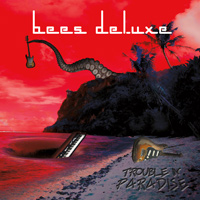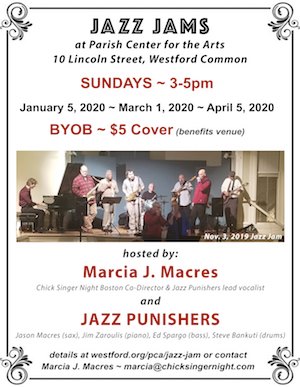 The Bees Deluxe have released another funky, bluesy, jazzy CDs. Trouble In Paradise is another offering of fun stuff from this outfit. The Bees Deluxe’s usual band leader, guitarist Conrad Warre, provides plenty of funky licks and cool phrasing. Keyboardist Jon Gamble keeps the organ and piano percolating with swirling chords and tasteful touches. Bassist Joe McEachern plays a smooth, solid low end. Drummer Patrick Sanders lays down all sorts of clever beats and snappy smacks.
The Bees Deluxe have released another funky, bluesy, jazzy CDs. Trouble In Paradise is another offering of fun stuff from this outfit. The Bees Deluxe’s usual band leader, guitarist Conrad Warre, provides plenty of funky licks and cool phrasing. Keyboardist Jon Gamble keeps the organ and piano percolating with swirling chords and tasteful touches. Bassist Joe McEachern plays a smooth, solid low end. Drummer Patrick Sanders lays down all sorts of clever beats and snappy smacks.
Opening number “That’s What I’m Living For” lurches forward with a purposeful funk drive. Bass and drums knock it forward with swift, funky persistence. Gamble presses out of his keys all sorts of organ swirls, smoky, rocking, jumping on the groove with a confident stride. Warre’s guitar jumps in with abundant riffing and mean phrasing. This number leaps forward like a rattlesnake jumping out of its coil.
“Cell Phone” jumps in with a striking sustain from guitar and organ. That initiates a constant tradeoff from the two instruments. Warre unleashes his riffs while Gamble meets him measure for measure with simmering organ chords. Things keep getting more interesting. Warre plays some innovate phrases with a metallic sound effect. Gamble sustains his rangy organ notes for a fine layering over all the funk from the other players.
A large but soft vocal approach on “Hammers & Apples” fills the number with its distinct personality. A gentle application of ringing guitar notes and breezy organ notes wrap around the vocal like groupies gathering around a hip cat after a show. This song compels one to listen with his easeful sense of cool. The vocal timbre implies street savvy, someone who’s been around and knows the score. Jazzy progressions from the guitar and organ coupled with considerate low end and brushed drumming layer the sonic landscape with a wide, rangy sound that also pulls in the listener.
“Don’t Look Happy” revolves around Joe McEachern’s nimbly applied bass beats. McEachern’s low end anchors this take-your-time groove number with deep, meaningful notes that have a lot going on inside each one. Sanders puts in a lot of fills around the bass, frees styling it well, letting his snappy skin smacks build into irresistible patterns. Warre pours a lengthy dose of wiry guitar phrase over the funk proceedings from the rhythm section, injecting another interesting personality and feel. Their individual parts come together like the words in a discussion from numerous conversationalist.
“Chromascoping” turns up the heat. Warre presses out more of his robust guitar lines, going toe to toe with Gamble’s bracing organ work. Things get more fiery here. Just when a listener starts bobbing his head to the organ rhythm, appreciating it’s funk appeal, the guitar slides in like a ball player to home plate, jubilant and exciting. Rocking guitar intensity. Simmering blues organ. Speedy grooves. This number has all the special ingredients for a wild party vibe with skillful musicianship.
“Repossession” has a humorous lyrical tale about someone’s beloved personal possessions being repossessed by a repo man. Warren applies his smooth croon to deliver these words of warning in an appealing ooze of cool. Sanders offers a bubbly drum solo near the conclusion that descends into a fun fall.
A jazzy guitar excursion makes up “Musical Chairs.” Warre picks, bends, and sustains several brittle notes. His approach ranges from snappy to dreamy. One moment he’s hitting a heavily accented notes. The next, he’s offering a feisty phrase. There is true sonic beauty in the atmospheres and sonic landscapes he constructs with his techniques.
“New Jersey Turnpike” is a delight of funk guitar. Jumpy guitar riffs and phrases dance around the groove. Warre clearly enjoys getting an acidy sound out of his guitar and then exploring where he can go with that. The distinctive guitar rides over a movable, bulbous rhythm section, like something smooth and metallic gliding over sheer ice. There’s also a lot going on underneath the guitar. Organ, bass, and drums are each offering up a three dimensional support for the main melodic line.
“Lost In Space” is the last track listed on the jacket’s liner notes. It feels like a departure. Warre’s down tempo but heavily accented notes convey a solidness within their tightly wound melody line. There is an unlisted bonus track at the end. Warre presses out a contemplative guitar line next to brief, controlled drum fills. The bass peppers the soundscape with quick, brief notes that create an eerie effect in the sound. It’s not clear what kind of emotion is being expressed in this instrumental piece. But, it sure would fit in nicely on a science fiction movie soundtrack.
The Bees Deluxe have come up with another fun, impressive album. Trouble In Paradise is no trouble to listen to. The coolest ideas are conveyed with fun, crafty numbers. This band is one that can impress the critics, win over fans, and likely get hired as a party band. These players are complex musicians who know how to make their clever ideas work for a lot of different kinds of listeners.

